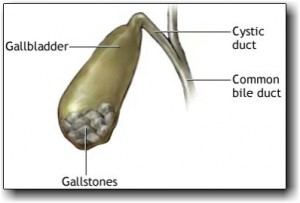Gallbladder problems rank fairly high among health problems in Canada: nearly 20% of women and 10% of men harbor gallstones. According to the Canadian Liver Foundation certain racial groups have an even higher incidence: in the aboriginal population between 70 and 80% are affected. Statistics in the US would be similar.
Leaders in gallstone research at Harvard Medical School came up with new studies recently from the large scale Health Professional Follow-up and the Nurses Health study with respect to how eating habits influence the formation of gallstones.
Dr. Chung-Jyi Tsai and colleagues examined the relationship between nut consumption and the risk of gallstone disease. Men who consumed about 5 oz of nuts per week had a significant decrease in gallstone development than those who ate less than 1 oz per month. Women fared similarly. The 20-year study involving 80,718 female nurses found that women who consumed at least 5 oz of nuts per week had a 25% lower risk of developing gallstones requiring gall bladder surgery than those who rarely ate nuts or nut butter. It turned out that not all nuts have equal benefits. Peanuts decreased the risk only by 19%, peanut butter consumption decreased the risk by 15%, whereas other nuts lowered the risk for gallstones by 35%. Nuts offer this prevention due to a combination of fiber, unsaturated fatty acids, as well as magnesium and beneficial plant chemicals. Fats as “the good guys” in gallstone prevention may sound like a novel idea, but there are differences in fats: it is the monounsaturated fats and the polyunsaturated fats that are the winners. They are the ones that are found in nuts or vegetables, but not in meat.
The coauthor of the Harvard study, Dr. Edward Giovanucci, points out, that a diet that is high in saturated fat (the fat which prevails in meat products) and high in refined carbohydrates (bakery products, pasta, sugar) increases the risk of gallstones. It also depends on the dosage: those who consumed a diet high in insoluble fiber decreased the risk by 17%. So, what is the reason? Insoluble fiber acts like a broom that sweeps waste out of the intestinal tract faster than a diet that lacks fiber. It also reduces the bile acid secretion, increases insulin sensitivity and lowers triglycerides (harmful blood fat levels). The good news is, that you can get it all at a local supermarket. Nuts, tomatoes, squash, cucumbers, whole grains like cracked wheat (as opposed to flour), beans, apples, berries and pears are all good and inexpensive sources.
For more info on gallstones: http://nethealthbook.com/digestive-system-and-gastrointestinal-disorders/gallbladder-disease/cholelithiasis/
Reference: National Review Of Medicine, November 30,2004, page 13
Last edited October 27, 2014






